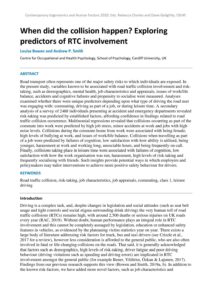| Document | Author Louise Bowen and Andrew P. Smith |
| Abstract Road transport often represents one of the major safety risks to which individuals are exposed. In the present study, variables known to be associated with road traffic collision involvement and risk-taking, such as demographics, mental health, job characteristics and appraisals, issues of work/life balance, accidents and cognitive failures and propensity to socialise were measured. Analyses examined whether there were unique predictors depending upon what type of driving the road user was engaging with: commuting, driving as part of a job, or during leisure time. A secondary analysis of a survey of 2488 individuals presenting at accident and emergency departments revealed risk-taking was predicted by established factors, affording confidence in findings related to road traffic collision occurrence. Multinomial regressions revealed that collisions occurring as part of the commute into work were predicted by high job stress, minor accidents at work and jobs with high noise levels. Collisions during the commute home from work were associated with being female, high levels of bullying at work, and issues of work/life balance. Collisions when travelling as part of a job were predicted by failures of cognition, low satisfaction with how ability is utilised, being younger, harassment at work and working long, unsociable hours, and being frequently on-call. Finally, collisions taking place in leisure time were associated with failures of cognition, low satisfaction with how the work organisation was run, harassment, high levels of risk-taking and frequently socialising with friends. Such insights provide potential ways in which employers and policymakers may tailor interventions to achieve more positive safety behaviour for drivers. |

